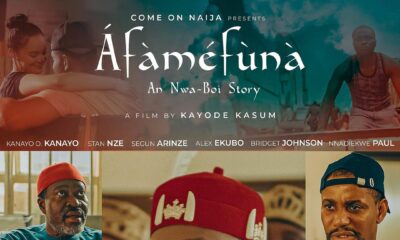Features
Ekene Mekwunye: This is Why You Shouldn’t Compare Nollywood to Hollywood
 My name is Ekene and I am a filmmaker. Whenever I introduce myself like that, it elicits different reactions from people. Amongst Nigerians, you can see it on their faces when they smile and say, “oh! Those people who make those juju films”. Sometimes, they call them ‘substandard’ or ‘terrible quality’ or ‘poor story telling’ movies.
My name is Ekene and I am a filmmaker. Whenever I introduce myself like that, it elicits different reactions from people. Amongst Nigerians, you can see it on their faces when they smile and say, “oh! Those people who make those juju films”. Sometimes, they call them ‘substandard’ or ‘terrible quality’ or ‘poor story telling’ movies.
I can understand what they are trying to say. That how I thought years ago until I got more information. They are comparing our movies with the Hollywood movies, which is what they watch at the cinemas. About 90% of the movies screened at Nigerian cinemas are Hollywood movies. People ask things like, “when will you guys start making movies like the guys in Hollywood do?”
I realized that a lot of people in the upper and middle class in Nigeria don’t watch Nigerian movies. This could be due to the fact that their only thinking of Nigerian movies comes from what they used to see years ago… without realising a lot has changed. They prefer to watch American series and movies and wonder why we can’t make it like the Americans do.
The American film industry is over 100 years old. They also had a time when they made movies that people felt were not that good. The average amount of money it takes a studio just to market a movie in Hollywood is about $40 million, without production cost. So, it’s not right to expect that a house built with that amount, and the one built with $20,000 would look alike.
The reason why we can’t spend beyond what we spend now is also because we know how much return it would make. Isn’t it unwise to make a movie for $100,000 when the average amount a Nigerian movie makes in returns is less than $40,000? Americans did not start that industry by spending millions on a movie. They grew to where they are. Americans can afford to spend 100 million to make a movie because they know the movie would open in over 100,000 screens with different slots per day and about 200 seats per screen.
Do the math, compared to about 20 + cinemas here. We know we have a passion for filmmaking, but it’s also what we use to feed our families, send our kids to good schools and pay the bills.
As they ask why we can’t be like Hollywood, what they fail to realise is that we don’t plan to be like Hollywood. It makes no sense for us to try and copy Hollywood. If there’s anything we want to be like that resembles Hollywood, it’s their distribution network and how they have been able to get their movies to all ends of the earth. This is responsible for how much money they earn each time they make a movie. Nothing else!
So why don’t I want us to be like Hollywood? Because we can never be as good as they are in their game, talk less of being better. Why should we try to play in a game we can never win? Imagine the Super Eagles (Nigeria’s football national team) about to play a match and we already know they have lost before the blast of the first whistle.
Nollywood is not a product, but a system. The word ‘Nollywood’ was coined by a foreign journalist who came to Nigeria and saw a group of people who were telling their stories in a unique way. People used little resources and a short time to make a movie that was being consumed by a large part of their population and in other parts of the continent. He was amazed at the turn around time of investment in our movies and saw how these ingenious people were able to make something out of nothing. So the ‘Nolly’ came from the word ‘nothing’ and ‘wood’ to have a semblance with the popular film industry, Hollywood. That’s how the name ‘Nollywood’ came about. What makes us unique is how we have been able to tell our stories in a distinctive way and have gotten the attention of the whole world. If an American made a feature movie with $5000 in 4 days, he would have been on the front pages of their newspapers and magazines but because Nigerians did it, we don’t see anything special about it. Hence, the skewed way they world see things. In this space, we would beat Hollywood any day and twice on Sundays.
It is important to note that with these ‘rubbish’ and ‘low quality’ films, we have been able to get Africa and the rest of the world watching our movies. With this ‘lackluster’ way of making movies, we have been able to build a film industry that has grown to become the second largest film industry in the world currently. For the first time, about two years ago, it was captured in our GDP, the entertainment industry generating close to 1% of it. It generated 1.47% the first quarter of 2016. I was in South Africa for a workshop a few days ago. I stayed with a family in a village called Makuleke. It’s beside Kruger National Park, just by South Africa’s border with Mozambique. I was amazed that when I returned by 8pm everyday till about midnight that they went to bed, they only watched Nigerian movies.
I was on a plane to Nairobi from Johannesburg and as I walked down the aisle from the toilet to my seat during the flight, I was surprised that most of the passengers including some white people, were watching Nigerian movies. My experience in Nairobi was amazing because at a time I felt I was in Nigeria.
While we we’re here despising our movies, a Nigerian based in the UK came with a white partner to just deal with Nigerian movies. Based on his experience with Youtube and the lots of views, he started buying rights to them and started an online TV platform and within months was worth lots of millions of dollars. Our Nigerian actors are amazed at how they are treated as demigods when they visit other countries especially other African countries. Some can hardly walk on the streets as everyone wants to catch a glimpse of them. Our films have penetrated into different parts of the world despite its poor distribution network. We see foreigners buying our movies at Alaba in bulk to take back with them when they come to Nigeria.
It’s worthy to note that I am not saying there’s nothing to improve in our industry. We still have to look for more effective ways to generate our content and build a structure that would make distribution functional. One thing people talk about a lot of time when referring to Nigerian movies is quality. But you must agree that looking at our movies a few years ago and now, there are remarkable improvements. We have to realize that quality in itself is relative.
Like I learnt from Charles Igwe recently, there are two elements of quality in filmmaking. Picture quality and sound quality. Once we can take care of these two, we would be just fine to tell our own stories. If you played Mr. Bean side by side with Mr. Ibu in Sweden, the Swedish people might prefer to watch Mr. Bean and you would say it’s because of its quality and universal appeal; but let’s take the same scenario to Malawi or the Caribbean and see which they would prefer. We have to understand that how you choose to tell your story does not make yours inferior to the other person. Just like we are beginning to learn in Nigeria that English is a language and medium of expression not a measure of intelligence. So, the fact that I can communicate effectively in English and the guy beside me can’t but can do it better in Igbo doesn’t mean I am more intelligent than he is. We can see this in our everyday life as we see Igbo traders who hardly went beyond primary 6 in school build businesses and understand that business better than some who went to business schools. So when a few of them come from abroad and tell us that they want to teach us filmmaking, we often tell them to first go and make a film with $10,000, finish it within the time we do and if it’s a better product, you can then teach us filmmaking.
Nollywood was started by a group of people who just wanted to tell their story and one that their people could identify with. Unlike our other African brothers (especially the Francophone countries) who would not be able to make a film until they got grants from Europe or America who will then dictate how the film will look. These people were able to build the industry with the little money they had to where it is today without support from any government and NOT even the Nigerian government. It’s sad that the government has failed to realize the potentials and influence that the film industry has. The number one branding tool of the United States today and has been for about a hundred years is Hollywood. What most people know of America comes from what they see in the movies.
I think it’s high time we started appreciating what we have and see how we came make it better.
Photo Credit: Scott Griessel | Dreamstime.com























